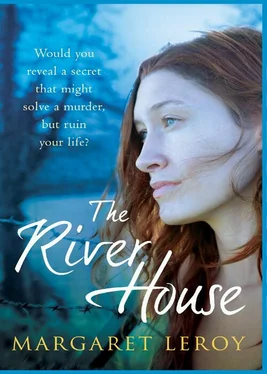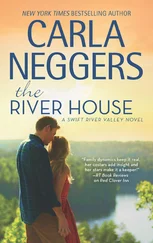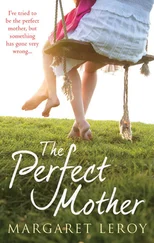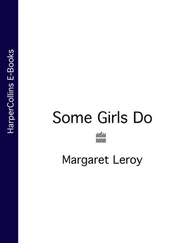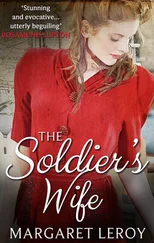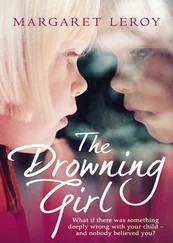Acclaim for Margaret Leroy’s The River House
“In some ways The River House reads like a suspense novel written by Richard Yates. Leroy handles marriage and domestic life with the same graceful, precise, rueful style as the late novelist did, though with a warmer, more hopeful intelligence… Leroy elucidates Ginnie’s moral conundrum beautifully. Although there is never much doubt as to what Ginnie will do, it’s how she does it that provides considerable suspense.” — Washington Post
“Leroy delineates Ginnie’s diffidence in a deliberately hypnotic, masterly fashion. Her quiet, self-assured narrative voice delivers tremendous psychological depth and emotional resonance.”
—Kirkus Reviews
“Leroy’s sensuously ethereal, subtly electric drama discerningly probes the affective fragility of a woman struggling to preserve all she holds dear, without losing herself in the process.”
—Booklist
“Margaret Leroy, who also wrote the excellent Postcards from Berlin, makes you care about her characters, who feel so real that you know they must be out there leading the lives she talks about… Settle down in a deep armchair or hammock with The River House, and make sure you’re comfortable—you won’t want to get up for a while.” —BookLoons
“This gripping suspense novel by British author Margaret Leroy is more about the complex relationships between people than it is about crime. Leroy expertly draws a picture of a woman and a family in crisis and the moral questions one sometimes has to face.”
— Toronto Sun
Acclaim for Margaret Leroy’s The Perfect Mother A New York Times Notable Book of the Year
“It’s a premise familiar from some of Hitchcock’s best movies: seemingly upright people, through no fault of their own, see their lives unravel before their eyes. Margaret Leroy’s [The Perfect Mother] taps the compelling emotions inherent in that storyline.” —Seattle Times
“Written with a wonderfully convincing authority… I was eager to find out what happened next. I dreaded the worst and I hoped for the best—and I won’t tell you which happens.”
—New York Times
“The novel reads like a thriller and is brilliant at portraying the slow, steady disintegration of a seemingly ordinary life when secrets are unearthed and dark suspicions spread.”
—Baltimore Sun
Acclaim for Margaret Leroy’s The Drowning Girl
“Margaret Leroy’s eerily lovely novel [The Drowning Girl ] is one of those rare books you’ll sit with till your bones ache.” —Oprah Magazine
“This is a really special book. Sylvie’s vulnerability is so powerfully drawn, so flesh-and-blood real, that you want to reach into the pages and protect her yourself.”
—Louise Candlish
“Every once in a blue moon, a masterful writer dives into Gothic waters and emerges with a novel that—like Daphne du Maurier’s Rebecca, Henry James’s The Turn of the Screw, or, more recently, Patrick McGrath’s Asylum —simultaneously celebrates and transcends the genre. Welcome Margaret Leroy to the clan. Haunted and haunting, [The Drowning Girl ] is a wonderfully original, deliciously suspenseful mystery.” —Publishers Weekly
“This book is perfect for anyone wanting an intriguing story which is also well-written and moving.”
—Adele Geras
“This book was compelling from the first chapter. Margaret Leroy’s twists are carefully orchestrated so Grace had my sympathy and understanding. It is a book I will never forget. Read it—it is such a refreshing change from the usual frothy stories.”
—Candis
The
MARGARET LEROY

www.mirabooks.co.uk
ACKNOWLEDGEMENTS
I am deeply grateful to my wonderful editor, Maddie West, for her intelligence and empathy; to the brilliant team at MIRA, especially Catherine Burke and Oliver Rhodes; to Judy Clain, my editor at Little, Brown and Company, New York; and to my marvellous agents, Kathleen Anderson and Laura Longrigg. Brian Hook very generously enlightened me about the workings of the Metropolitan Police—any errors are, of course, mine alone. My thanks also to Lucy Floyd and Vicki Tippet for contributing contacts and insights; and as always to Mick, Becky and Izzie for their love and understanding.
In researching this story, I found these books especially valuable: “Men Who Batter Women”, by Adam Edward Jukes; “A Celtic Miscellany: Translations from the Celtic Literatures,” by Kenneth Hurlstone Jackson; and Peter Ackroyd’s “London: A Biography”.
He’s building a wall from Lego. There’s no sound but the click as he slots the bricks together, and his rapid, fluttery breathing. His face is white as wax. I know he’s very afraid.
‘You’re building something,’ I say.
He doesn’t respond.
He’s seven, small for his age, like a little pot-bound plant. Blond hair and skin so pale you’d think the sun could hurt him, and wrists as thin as twigs. A freckled nose that would wrinkle if he smiled: but I’ve yet to see a smile.
I kneel on the floor, to one side of him, so as not to be intrusive. His fear infects me: the palms of my hands are clammy.
‘Kyle, I’m wondering what kind of room you’re building. I don’t think it’s a playroom, like this one.’
‘It’s the bedroom,’ he says. Impatient, as though this should be obvious.
‘Yes. You’re building the bedroom.’
His building is complete now—four walls, no door.
It’s a warm September afternoon, syrupy sunlight falling over everything. My consulting room seems welcoming in the lavish light, vivid with the primary colours of toys and paints and Play-Doh, and the animal puppets that children will use to speak for them, that will sometimes free them to say astonishing things. The walls are covered with drawings that children have given me, though there’s nothing of my own life here—no traces of my family, of Greg or my daughters, no Christmas or holiday photos: for the children who come here, I want to be theirs alone for the time that they’re with me. The mellow light falls across Kyle’s face, but it doesn’t brighten his pallor.
He digs around in the Lego box, looking for something. I don’t reach out to help him: I don’t want to distract him from his inner world. His movements are narrow, restricted; he will never reach out or make an expansive gesture. Even when he’s drawing he confines himself to a corner of the page. Once I said, Could you do me a picture to fill up all this space? He drew the tiniest figures in the margin, his fingers scarcely moving.
He finds the people in the box. A boy, and an adult that could be a man or a woman: just the same as last time.
‘The people are going into your building. I’m wondering what they’re doing there.’
He’s grasping the figures so tightly you can see his bones white through his skin.
I feel a slight chill as a shadow passes across us. Instinctively, I turn—thinking I might see someone behind me, peering in at the window. But of course there’s nothing there—just a wind that stirs the leaves of the elms that grow at the edge of the car park.
There’s a checklist in my mind. Violence, or sex abuse, or something he has seen—because I have learnt from years of working with these troubled children that it’s not just about what is done to you, that what is seen also hurts you. I know so little. His foster parents say he’s very withdrawn. His mother could have helped me—but she’s on a psychiatric ward, profoundly depressed, not well enough to be talked to. The school were certainly worried. ‘He seems so scared,’ said the teacher who referred him to the clinic.
Читать дальше
